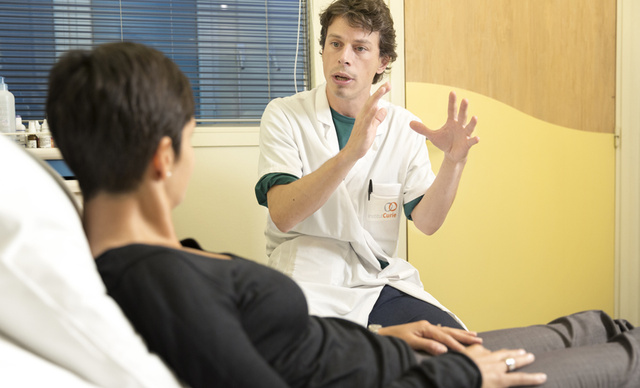Combating chronic pain
From surgery and hypnosis to medication, Institut Curie puts all of its expertise and tools to work to prevent and treat the chronic pain that can affect patients suffering from cancer.

A tumor compressing a sensitive organ, mucous membranes damaged by chemotherapy, difficult healing after surgery, inflammation due to radiotherapy: cancer can cause a variety of different types of pain. If this pain lasts longer than three months, it is deemed to be “chronic,” and can affect quality of life and lead to psychological distress.
Effective weapons in the fight against pain
At Institut Curie, the patient’s pain is assessed to perform a precise diagnosis. Preventive and curative treatments are adapted to suit each situation throughout the period of care.
The methods for treating chronic pain are a very important component of the patient’s care: the physicians and caregivers at Institut Curie do all they can to prevent pain from occurring and to treat it as effectively as possible with the aim of reducing side effects to a minimum and ensuring well-being for the patient.
As far as possible, the cause of the pain will be treated, including chemotherapy for reducing a tumor mass, surgery for decompressing an organ, radiotherapy for painful bone metastasis and articular infiltrations. Physicians are also equipped with a battery of analgesic medications with different modes of action to combat the pain itself.
More specific analgesic techniques can also be used, such as:
- Interventionist radiology for analgesic effect.
- Radiofrequency.
- Cementoplasty of weakened bones.
- Application of capsaicin patches.
- Injection of analgesics in contact with the spinal cord (intrathecal analgesic).
Providing patients as quickly as possible with the benefits of medical progress in the field of pain is a priority for Institut Curie. Indeed, developing new treatment methods remains vital to the pain management team. Such innovative treatments as local injections of botulinum toxin for stubborn neuropathic pain are thus being incorporated at the institute.
Gentle complementary strategies and a caring approach
To prevent and treat chronic pain, non-drug solutions such as hypnosis, relaxation, sophrology and auriculotherapy are also offered. These complementary treatments often help to reduce medication doses.
Physicians and specialized healthcare professionals from the Pain unit also offer patients and their families understanding and a sympathetic ear. These professionals collaborate together and bring their skills to bear on treating all aspects of pain to the best of their abilities.
Therapeutic education workshops have also been established to help patients understand their pain and better manage it. These provide a forum for discussion between healthcare professionals and with other patients as part of group workshops.
The multiple skills of the Pain unit at Institut Curie
Teams specialized in treating pain are found at the Paris and Saint-Cloud sites and comprise intensive-care anesthesiologists, pain physicians, supportive-care physicians, neurosurgeons, psychiatrists and psychologists, hypnotherapists, orthopedists, specialized executives and nurses, radiologists and radiotherapists. The Pain unit offers consultations to over 3,000 patients per year. An intensive-care anesthesiologist and a pain physician are always on duty for pain treatment.
Emergency pain
- During the day, from 9:00 am to 6:00 pm, patients can call the pain office for an emergency appointment (appointments guaranteed within one week), or they can be seen the same day by visiting the walk-in consultation unit after first calling.
- During the night, patients can get advice or treatment from the intensive-care physician on duty from 6:00 pm to 9:00 am by calling the switchboard.

